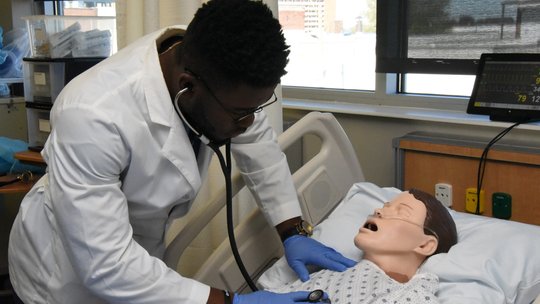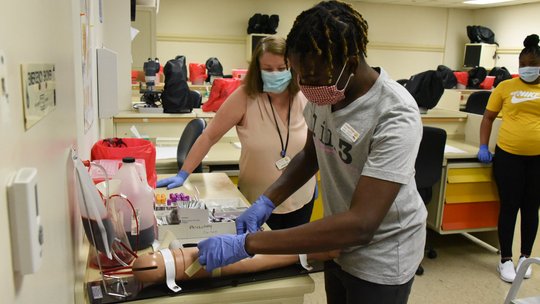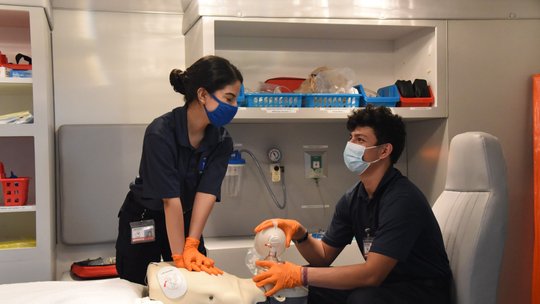
When Sheila L. Bouie overheard her husband’s response at a party, it got her thinking.
“So, what does your wife do?”
“Oh, you know. She’s a nurse. She does nurse stuff,” he said.
Nurse stuff?!
Then something clicked. “It dawned on me that whenever I would come home and talk about my day, as a practicing nurse, I would talk about it from the standpoint of hard tasks. I'm determined to help shift that image, and I do that with potential students,” she said.
As dean of Health and Natural Sciences at Southwest Tennessee Community College, Dr. Bouie’s attempt to clarify what a nurse is and what a nurse does are two separate concepts. She noticed a similar response to the “What is a nurse?” question from her freshmen students and potential students while visiting high schools for career day.
“They have a tendency to think about actions — giving shots, dosing pills, checking temperatures, drawing blood,” she said. “But when I ask them about specific job titles outside of nursing, like a medical lab technician or a phlebotomist, their mind widens, and they start to understand they have many options. Students often show up at Southwest and say they want to be a nurse because they don’t know anything else to be. But their definition of being a nurse is very constricted. They are surprised when they discover other health career options exist, like being a paramedic, physical therapist assistant or a radiologic technician.”

Bouie says students should know the Nursing and Allied Health Sciences programs can help them gain clinical skills at area medical centers, hospitals, and other health care facilities. The programs offer an associate degree and/or technical certificates, offered through shorter tracks that can be completed in one year or less. Students in the nursing program who complete the associate degree requirements have the opportunity to continue their education toward a bachelor’s degree at the University of Tennessee Health Science Center (UTHSC) College through its Nursing Partnership Enrollment Program (PEP).
Southwest also offers stackable credentials that lead to and promote specific professional licensure or certification required for employment. According to a recent report from Georgetown University's Center on Education and the Workforce, 72% of jobs in the country will require a college degree or post-secondary training by 2031. Southwest’s stackable credentials allow students to enter the workforce right away.
For those students who wish to enter the workforce quickly, Southwest’s Workforce Solutions Center (SWSC) is designed to provide a seamless career pathway between non-credit and credit courses. Sometimes, health care positions only require a certification to begin work immediately, and SWSC allows for that. It also allows for those students to continue with their education by crediting those certificates to a degree or transferring to a four-year college.
“All of the programs have very good employment rates ranging between 90-100% employment,” Bouie said. “Southwest produces graduates who serve Memphis-area hospitals, clinics, and other outpatient enterprises. There are a lot of opportunities out there in the health care sector.”
Within the Division of Health and Natural Sciences, Southwest also offers an associate degree in Funeral Service Education. The College is one of two schools in the state that prepares students for careers as a funeral director or embalmer. Bouie said the greatest needs currently are students for the Emergency Medical Services program, which instructs students on providing care for people experiencing injuries and medical emergencies.

“We are looking to diversify that program. There aren’t many women enrolled, and we want to change that trajectory,” she said. “Graduates enjoy fulfilling careers with local fire department and ambulance services. We also need more nursing students to produce more nurses to serve the area.”
Bouie hopes she and Southwest are broadening the definition of who is a part of the health care team and raising the discussion.
For more information about Southwest’s programs, visit Heath and Natural Sciences, call (901) 333-5425 or email sbouie@southwest.tn.edu.
Southwest Tennessee Community College is a Tennessee Board of Regents institution accredited by the Commission on Colleges of the Southern Association of Colleges and Schools with seven locations in Fayette and Shelby counties. Southwest awards associate degrees and certifications in more than 120 programs of study to raise educational levels, enhance economic development and enrich the quality of life for students and the community at large. Visit southwest.tn.edu.
